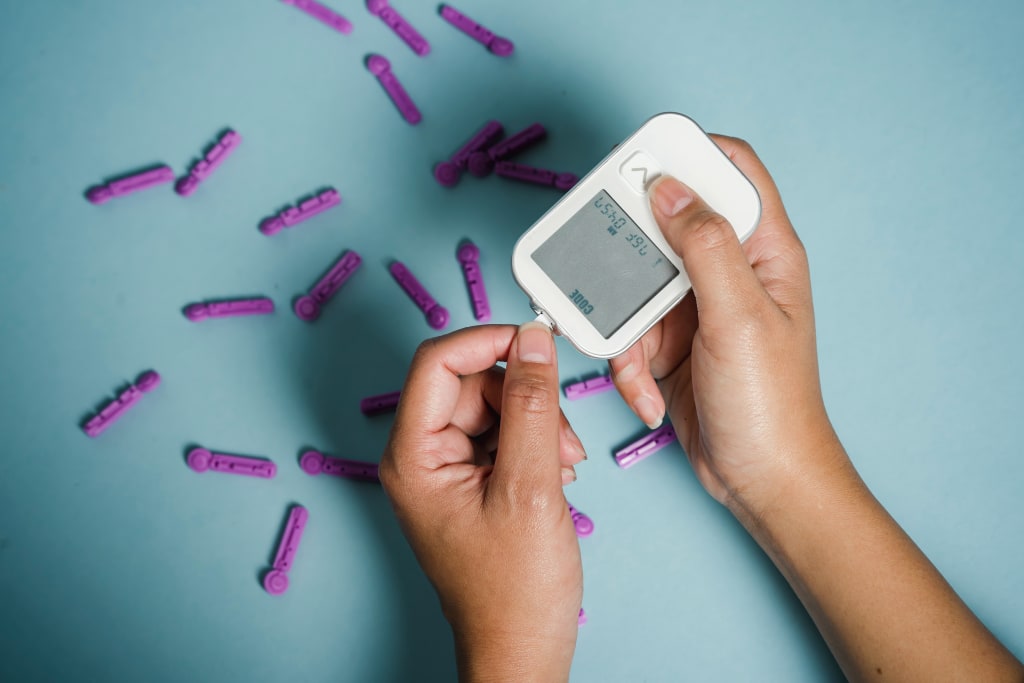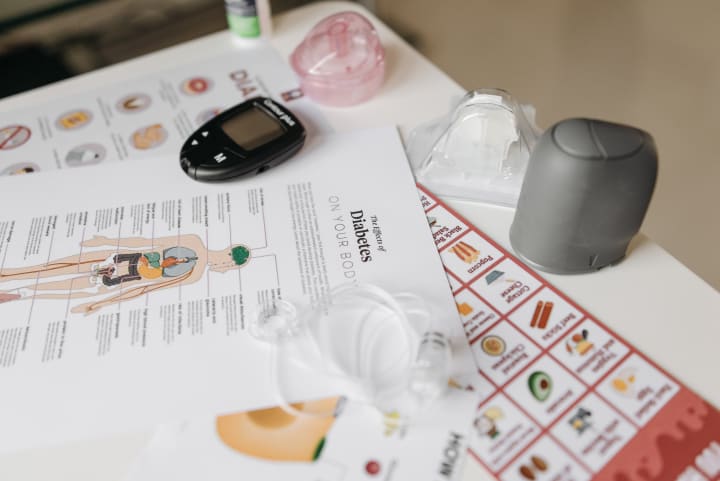Cracking the Blood Sugar Code: A Comprehensive Guide to Understanding and Managing Healthy Levels
A Step-by-Step Guide to Cracking the Blood Sugar Code

Blood sugar levels are important for our overall health and well-being. The scientific term for blood sugar is glucose, which is a type of sugar that our bodies use as energy. The glucose that we consume through food is transported to our cells through the bloodstream. However, if the glucose levels in our blood become too high or too low, it can cause a range of health problems. In this comprehensive guide, we'll explore the science behind blood sugar levels, the signs and symptoms of high and low blood sugar, and practical tips and tricks for managing healthy levels.
Understanding the Science Behind Blood Sugar Levels
When we consume food, our bodies convert the carbohydrates into glucose, which is then transported to our cells through the bloodstream. Insulin, a hormone produced by the pancreas, helps to regulate glucose levels in the blood by facilitating the absorption of glucose by the cells. The body also has a backup system in place to maintain glucose levels in the blood. When glucose levels drop too low, the liver releases stored glucose into the bloodstream to bring the levels back up. The body's ability to regulate blood sugar levels is a delicate balance that can be influenced by a range of factors, including diet, exercise, and medication. Understanding how these factors affect blood sugar levels is essential for managing healthy levels.
Signs and Symptoms of High and Low Blood Sugar
High blood sugar, also known as hyperglycemia, occurs when there is too much glucose in the blood. Symptoms of high blood sugar include increased thirst, frequent urination, fatigue, blurred vision, and slow healing of wounds. If left unmanaged, high blood sugar can lead to complications such as nerve damage, kidney damage, and cardiovascular disease. Low blood sugar, also known as hypoglycemia, occurs when there is not enough glucose in the blood. Symptoms of low blood sugar include sweating, shaking, dizziness, confusion, and irritability. In severe cases, low blood sugar can lead to seizures or loss of consciousness. It's essential to monitor your blood sugar levels regularly to identify any fluctuations and take steps to manage them.
Try this "30 Second Ritual" will balances your Blood Sugar and Burns Belly Fats and may even reduce hunger cravings, which can make it easier to lose weight without having to stick with a bland diet.
Risk Factors for High Blood Sugar Levels
Several risk factors can increase the likelihood of developing high blood sugar levels. Some of these include:
- Family history of diabetes
- Being overweight or obese
- Sedentary lifestyle
- High blood pressure
- High cholesterol levels
- Gestational diabetes during pregnancy
- Polycystic ovary syndrome (PCOS)
If you have any of these risk factors, it's essential to take proactive steps to manage your blood sugar levels.
Risk Factors for Low Blood Sugar Levels
Low blood sugar levels can be caused by several factors, including:
- Excessive alcohol consumption
- Certain medications
- Skipping meals or fasting
- Vigorous exercise without proper nutrition
- Insulin-producing tumors
If you're at risk of developing low blood sugar levels, it's important to monitor your levels closely and take steps to prevent them from dropping too low.
Effects of Uncontrolled Blood Sugar Levels on the Body
Uncontrolled blood sugar levels can have a range of harmful effects on the body. High blood sugar levels can cause damage to the blood vessels, nerves, and organs, leading to complications such as heart disease, kidney disease, and nerve damage. Low blood sugar levels can cause seizures, loss of consciousness, and even death in severe cases. It's essential to manage your blood sugar levels to prevent these complications from occurring.
How to Measure Blood Sugar Levels
There are several ways to measure blood sugar levels. The most common method is through a blood glucose meter, which uses a small drop of blood to measure glucose levels. This method is quick and easy and can be done at home. Another method is a continuous glucose monitor, which is a small device that is placed under the skin to measure glucose levels continuously. It's important to monitor your blood sugar levels regularly and keep track of any fluctuations.
Healthy Blood Sugar Level Ranges
The ideal blood sugar level range varies depending on the individual and the time of day. Generally, a healthy blood sugar level range is between 70 and 130 mg/dL before meals and less than 180 mg/dL two hours after meals. If your blood sugar levels consistently fall outside of this range, it's essential to speak with your doctor to develop a management plan.

Lifestyle Changes to Manage Blood Sugar Levels
Making lifestyle changes can be an effective way to manage blood sugar levels. Some lifestyle changes that can help include:
- Regular exercise: Exercise can help to lower blood sugar levels by increasing insulin sensitivity.
- Healthy diet: Eating a healthy diet that is low in sugar and carbohydrates can help to regulate blood sugar levels.
- Stress management: Stress can cause fluctuations in blood sugar levels, so it's essential to manage stress levels effectively.
- Weight management: Maintaining a healthy weight can help to regulate blood sugar levels.
Incorporating these lifestyle changes into your daily routine can help to manage blood sugar levels and improve overall health.
If you're searching for an effortless way to enhance your health and shed pounds without the tedium of a tasteless diet, consider trying the "30 Second Ritual"! This uncomplicated yet effective routine can regulate your blood sugar levels, burn unwanted belly fat, and even decrease hunger cravings. The best part is that it only takes 30 seconds a day! To learn more and embark on your journey to a healthier, happier you, click here.
Dietary Changes to Manage Blood Sugar Levels
Dietary changes can also be an effective way to manage blood sugar levels. Some dietary changes that can help include:
- Eating complex carbohydrates: Complex carbohydrates are digested more slowly than simple carbohydrates, which can help to regulate blood sugar levels.
- Increasing fiber intake: Fiber can help to slow down the absorption of glucose into the bloodstream.
- Avoiding sugary drinks: Sugary drinks can cause spikes in blood sugar levels, so it's best to avoid them.
- Eating smaller, more frequent meals: Eating smaller, more frequent meals can help to regulate blood sugar levels throughout the day.
Working with a registered dietitian can help to develop a dietary plan that is tailored to your individual needs.

Medications and Supplements to Manage Blood Sugar Levels
Medications and supplements can be effective in managing blood sugar levels for individuals with diabetes. Some medications that can help include:
- Insulin: Insulin is a hormone that is used to regulate blood sugar levels for individuals with type 1 and type 2 diabetes.
- Oral medications: Several oral medications can help to regulate blood sugar levels for individuals with type 2 diabetes.
- Supplements: Some supplements, such as chromium and alpha-lipoic acid, can help to regulate blood sugar levels.
It's essential to work with your doctor to determine the best medication or supplement plan for your individual needs.
Blood Sugar Management Tips for Individuals with Diabetes
For individuals with diabetes, managing blood sugar levels is particularly important. Some tips for managing blood sugar levels include:
- Monitor blood sugar levels regularly
- Follow a healthy diet that is low in sugar and carbohydrates
- Take medications as prescribed by your doctor
- Exercise regularly
- Stay hydrated
- Manage stress levels effectively
It's important to work closely with your doctor to develop a management plan that is tailored to your individual needs.
Try this "30 Second Ritual" will balances your Blood Sugar and Burns Belly Fats and may even reduce hunger cravings, which can make it easier to lose weight without having to stick with a bland diet.
Conclusion and Final Thoughts
Managing healthy blood sugar levels is essential for overall health and well-being. Understanding the science behind blood sugar levels, the signs and symptoms of high and low blood sugar, and practical tips and tricks for managing healthy levels is key to taking control of your health. Incorporating lifestyle changes, dietary changes, and medications or supplements as needed can help to regulate blood sugar levels and prevent complications from occurring. Remember, managing blood sugar levels is a team effort between you and your healthcare provider. With the right management plan in place, you can take control of your blood sugar levels and live a healthy, happy life.
Want an easy way to improve your health and lose weight without a boring diet? Try the "30 Second Ritual"! It can balance your blood sugar, burn belly fat, and reduce hunger cravings. It only takes 30 seconds a day. Click here to learn more and start your journey to a healthier you!
About the Creator
Agung Prama
Passionate about exploring the latest developments in the world of health and wellness.
Enjoyed the story? Support the Creator.
Subscribe for free to receive all their stories in your feed. You could also pledge your support or give them a one-off tip, letting them know you appreciate their work.





Comments
There are no comments for this story
Be the first to respond and start the conversation.